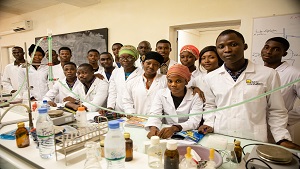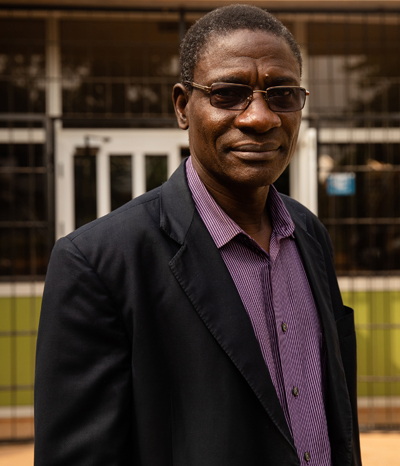Support for the pharmaceutical curriculum at the University of Lomé
— Togo —

BACKGROUND
Despite a life expectancy of 63 years of age, higher than the average in sub-Saharan Africa, Togo suffers from high rates of maternal and infant mortality. The government responded to this situation in 2010 by joining the International Health Partnership and related initiatives (IHP+), then by unveiling the 2012-2015 National Health Development Plan. Among the objectives was strengthening the national pharmaceutical system and its drug management capabilities.
This substantial political will, boosted by the presence of key personalities at the University of Lomé, led Fondation Pierre Fabre to support the pharmaceutical curriculum of the Joint Faculty of Medicine and Pharmacy. When the Foundation first undertook this project in 2011, there was no dedicated faculty for this course material: the classes were given by professors from the Faculty of Science and speakers from Senegal and Burkina Faso.
With help from its scientific advisor, Jean Cros, and Senegalese, Burkinabe and French academics, the Pierre Fabre Foundation first assessed the educational content. Overall, taking into account local health needs, the team updated and expanded the content of the pharmaceutical disciplines in chemistry, pharmacology, toxicology and pharmaceutical technology, respecting the educational syllabus deliberated by the ECOWAS for the whole of West Africa. It was a lengthy process first begun in 2011, only to be completed at the end of 2015. Within the framework of the five-year National Health Development Plan launched in 2017 by the health authorities of Togo, one of the components of which is devoted to strengthening the national pharmaceutical system, the Pierre Fabre Foundation has committed itself to participate in the consolidation of the pharmacy sector of the University of Lomé. This new phase of support is focused on the continuing education of university pharmacists through the funding of Master’s, doctoral and agrégation scholarships. The partnership agreement also provides for support in structuring the sector, the acquisition of teaching materials and the implementation of teaching, particularly practical teaching, which is essential for the quality of training.
Today, the University of Lomé’s pharmacy programme has around 200 students. Graduates are destined to work in hospitals, analysis laboratories, pharmacies and the Centrale d’Achat des Médicaments Essentiels (public structure in charge of supplying medicines). This is a major challenge in a country that only had 230 pharmacists for 7 million inhabitants in 2015.
KEY FACTS
_____
Priority
Training of drugs specialists
Programme
Since 2011
Type of involvement
Distributor and operator
Objectives
- Continue to boost the professional skills of faculty stakeholders
- Raise awareness among the community about the importance of maternal and child care
- Reinforce health structures to guarantee quality healthcare
THE LATEST PROGRESS
_____
Training of teaching staff
Training in medical English (14 lecturers), training in how to boost the skills of staff working with women and newborns (5 participants, University of Burapha, Thailand)
Student training
Online course on care during pregnancy (21 female students with the equivalent of a 4-year Bachelor’s degree)
Participation in an international conference on how to reinforce the capacity for resilience of health workers (University of Khon Kean, Thailand)
Université de Lomé – Faculté Mixte de Médecine et de Pharmacie
Boulevard Gnassingbé Eyadema
BP 1515
LOME
TOGO
http://univ-lome.tg
Photo report produced at the Faculty of Health Sciences in Lomé in December 2018:
In 2018, the Fondation renewed this partnership for a five-year consolidation period, in part to create a dedicated, high-level faculty. Four new instructors began their work at the end of the year, five assistants received scholarships to pursue a master’s or doctorate, and teaching missions were organised to compensate for a lack of instructors in certain subjects, like galenical pharmacology or organic chemistry. The Foundation also funded creation of new laboratory classwork in phytochemistry, galenical pharmacology and pharmacology.
PROJECT PROGRESS
TO STABILISE THE TEACHING TEAM
The development of skills in several pharmaceutical sciences specialities makes it possible to build up a group of high-level teachers, which not only guarantees the quality of the teaching delivered but also positions the sector more favourably in the allocation of international funding to support its research projects.Thanks to the scientific equipment provided by the Pierre Fabre Foundation in 2018 and the support obtained from the University of Lomé and several donors such as the AUF (Agence universitaire de la Francophonie), UNFPA (United Nations Population Fund) or UNESCO, several projects have been developed by Togolese academics with a view to better understanding and managing the drug chain.
CONTRIBUTION TO THE FIGHT AGAINST COVID-19
The health crisis, which has seriously disrupted university agendas and the means of disseminating knowledge, has revealed the capacity of the Togolese teaching team to adapt to the constraints and to design concrete prevention actions for the direct benefit of the population. Thus, distance learning was guaranteed, teachers participated in the National Commission COVID-19 and in the quality control of essential medicines. The students produced hydro-alcoholic solutions and prevention equipment, and installed a bleach production site in the polyclinic in Tsévié (35 km north of Lomé) to prevent infections.
Translated with www.DeepL.com/Translator (free version)

Togo needs pharmacy professionals to secure the entire drug chain, from development to distribution and patient education – because the effectiveness of a drug also depends on the conditions of storage and use. The Pierre Fabre Foundation is helping us with the training of trainers: we need to equip our course with associate professors in all the key pharmaceutical disciplines in order to stabilise the teaching team. »
Yao Potchoo, Vice-Dean of the Faculty of Health Sciences of Lomé, Togo
PARTNERS
- Ministry of Higher Education and Research of Togo
- Ministry of Health and Social Protection of Togo
- University of Lomé
University of Bordeaux and Poitiers
See also
Creation of a pharmaceutical curriculum at the University of Antananarivo
Faced with an alarming lack of pharmaceuticals, Malagasy authorities called upon the help of partners, including the Foundation, in 2005. The objective was to found a Faculty of Pharmacy in Antananarivo.
27/07/2018See also
Supporting the Faculty of Pharmacy in Benin
Since 2021, the Fondation Pierre Fabre has been supporting the Faculty of Pharmacy, part of the Health Sciences Faculty at the University of Abomey-Calavi (near Cotonou). There are two objectives: to provide technical and scientific support and to facilitate exchanges with other faculties of pharmacy in Sub-Saharan Africa.
21/11/2022Follow our actions
Twenty-five years ago, the Fondation Pierre Fabre was recognized as a public-interest foundation
This was an essential step for Pierre Fabre, who was personally involved in obtaining that status. This recognition provided the assurance of reliability and steadfast presence, and also authorized the receipt of grants, donations and bequests by virtue of its public-interest mission.





















